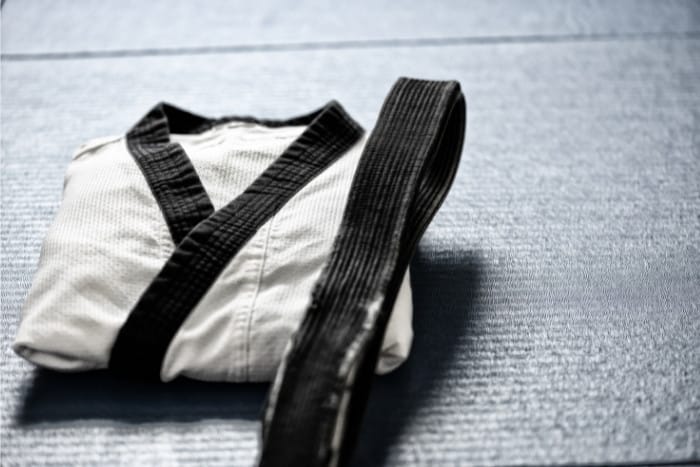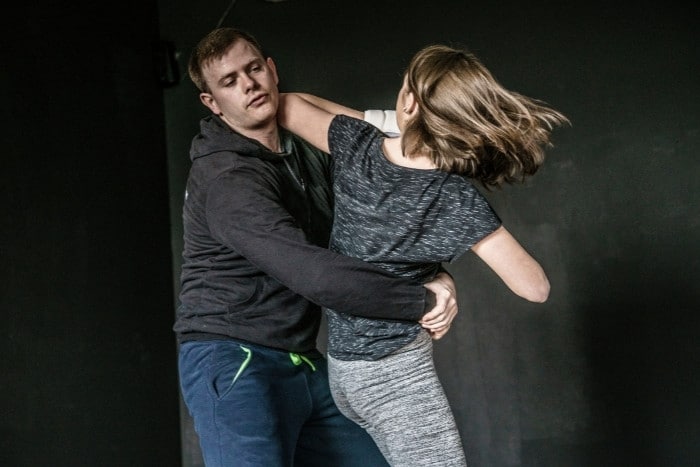Whether you’re just beginning your Krav Maga journey or have been practicing for a while now, you might want to know about the elite black belt club. Further, it may be tempting to have one yourself. So, how long do you need to wait before being eligible for a Krav Maga black belt?
It should take you no less than 7 to 8 years to earn your first black belt (Expert Level 1) in Krav Maga. Most people begin training three to four times a week for one hour but devote much more time after year 2. Anybody promising you a black belt before 7-8 years would simply be ‘giving’ the belt away.
This article will discuss the variables that shorten or lengthen your Krav Maga black belt journey. Also, we’ll go over rough time estimates required to earn every subsequent level (Dan) of the black belt.
Factors Influencing Your Krav Maga Black Belt Journey
Before I even begin, let me tell you something bluntly. Your primary concern when looking to learn Krav Maga shouldn’t be grades, belts, or patches.
They are simply a means of measuring your progress and shouldn’t mean anything more than that.
Further, by looking at your belt color, the only information your instructor should be getting is what to teach you next or make you revise. Krav Maga is meant for self-defense in a street fight with no rules.
That’s what you should be more worried about, i.e., defending yourself instead of when you’d get a black belt. If you’re only focused on badges to look cool, you’re already down the wrong path.

1. How Much Time You’re Putting Into Training
When most people learn Krav Maga, they usually train for around 3-4 hours a week. As they gain more skills and do not feel like quitting, they’re naturally inclined to devote more time.
That said, Krav Maga practitioners (Practitioner Level P1 to P5) are completely fine with taking three to four one-hour classes a week and progressing to the next levels.
However, things start to change from Graduate Level 1 (green belt). It means they’re much more serious about Krav Maga and understand that these limited number of training hours are simply not enough.
Hence, from year two onward, they increase the frequency and time of their training. Here we’re looking at around 2 hours of training per day, five to six times a week.
As you progress further to Graduate Levels G4 and G5, you’re sometimes training for 3-4 hours a day around the 5-year mark.
This keeps you on track towards earning your first black belt (Expert Level 1) in around 7-8 years.
But if you keep up the same speed as a beginner, i.e., three to four one-hour classes a week, it will take ages before you can even be considered for a blue belt, let alone a black one.
2. The Instructor or School You Train With
Many schools and instructors are notorious for being ‘belt factories.’ They are distributing the black belt for free without the person deserving it.
Sometimes the head instructor ‘awards’ themself a black belt so that they can open their own club and earn some money by preying on unsuspecting people.
However, any school or instructor of repute (someone who has been certified by a well-respected outfit) knows that there is no shortcut to becoming a true expert in Krav Maga.
If you want a black belt to feel important rather than having the ability to defend yourself in any situation, then, by all means, join a school that promises you one in three years.
Or maybe you could try some other martial art that gets you to the black belt much quicker. Krav Maga is not for you!
If someone is promising you a black belt before the 7-8 year mark or suggesting they’ve figured an easy route to it, you’re dealing with a phony person. It’s time to find a new instructor.
3. Nutrition and Lifestyle
You cannot just put anything inside your body and expect to keep up with the tough training required to earn a black belt in Krav Maga. Fast food WILL deposit unhealthy fats in your body.
Sugary drinks WILL make you feel sluggish. Together, they WILL slow you down. Your techniques and strikes would be slower, and so would your reflexes.
You cannot have that attitude of “Oh, I can eat anything as long as I burn it out in training.” Yes, you can burn it out, but that also means your physical progress would get plateaued.
You’d only be depositing fat, burning it, and getting caught in an endless loop. Of course, you’re allowed to have cheat days, but those should not become regular.
The black belt doesn’t just signify your Krav Maga skills. It also signifies a respected level of mental and physical conditioning.
Drink lots of water, and consume a balanced diet full of fruits and vegetables to keep your body and mind in peak condition. Quit smoking and alcohol and take a healthy amount of sleep.
4. How Quickly Do You Learn
As in any other area of life, not everyone learns Krav Maga at the same speed. You might be a slow learner who needs more repetitions to understand a certain technique.
While the same guy who started training when you did might already be showing promising results. Don’t let that keep you down. In the Krav Maga journey, you’re alone.
Your competition is not this guy. Someone out there might harm you one day, and that’s the only person you should be worried about.
Being a slow learner would delay your black belt certification for a few more years, but why are you in such a hurry? Who do you want to show the black belt to? Your attacker on the street?
And if you’re a fast learner, don’t get ecstatic, either. That timeframe of 7-8 years isn’t going to get any shorter. Okay, maybe a couple of months, but anything faster is only fooling yourself.
Respected schools would give it to you only when you deserve it, and it’s time.
5. What’s Going On In Your Life
Whatever your life or day looks like today, it might not be the same in the next few years. Many people start their Krav Maga journey.
Only a subset of that train for a few years and are sometimes forced to take a break or quit altogether.
Health issues, mental breakdowns, personal losses, celebrations, tours, work commitments, etc., sometimes don’t allow you to train for a while. And it’s completely alright.
It’s all a part of the journey called life. If you’re open to returning to training whenever possible, don’t consider the break a hindrance in your Krav Maga black belt journey. Don’t lose hope due to frustration.
These instances may delay the certification a bit, but the life-saving skills you’ll continue learning will not leave you if you keep training.
Till life is not throwing something in your way which forces you to quit Krav Maga altogether, you’re good to go.
Time Required To Reach Your First and Subsequent Black Belt Levels
Many finish Practitioner Levels (P1 to P5) quickly in around three years. Clearing all Graduate Levels (G1 to G5) certainly takes more time, and you’re looking at another 4-5 years.
Now, after you’ve cleared all the Graduate Levels and devoted 7-8 years of your life training extensively for Krav Maga, you’ll be in a position to give your first black belt test. However, it’s by invitation only.
Being a brown belt and having trained for 7-8 years doesn’t automatically entitle you to a black belt.
If your school or head instructor feels otherwise, they might refrain from entertaining your plea till you have your flaws sorted.
Those flaws need not only be technical but could also be related to temperament and attitude. Nobody wants to impart expert-level skills to someone who won’t be able to handle them.
Further, beyond the 4th Dan, only a handful of individuals hold higher certifications.

| Level | Focus On | Minimum Training Time Experts Devote To Clear |
|---|---|---|
| Expert Level 1 – Black Belt 1st Dan | Military-level skills, rifles, and advanced knife techniques. | 1-2 years |
| Expert Level 2 – Black Belt 2nd Dan | Police level skills means exercising more restraint rather than simply being a killing machine. Pistol, sticks, tasers, and crowd control. | 2-3 years |
| Expert Level 3 – Black Belt 3rd Dan | Being able to provide security. Refining your skills. | 5 years |
| Expert Level 4 – Black Belt 4th Dan | VIP Protection Capability. Protecting someone else’s life who doesn’t know how to fight back is completely different from simply defending yourself in a fight. Refining your skills. | 5 years |
| Expert Level 5 – Black Belt 5th Dan | Fighting in special situations and arenas like planes, trains, boats, cars, ships, and buses. Refining your skills. | 5 years |
| Master Level 1 (Expert Level 6) – Black Belt 6th Dan | Refining your skills. | 5 years |
| Master Level 2 (Expert Level 7) – Black Belt 7th Dan | Refining your skills. | 5 years |
| Master Level 3 (Expert Level 8) – Black Belt 8th Dan – Red and White belt | Refining your skills. | 5 years Awarded by the Grandmaster |
| Master Level 4 (Expert Level 9) – Black Belt 9th Dan – Red and White belt | Refining your skills. | 5 years Awarded by the Grandmaster |
| Master Level 5 (Expert Level 10) – Black Belt 10th Dan – Red belt | Refining your skills. | n.a. An eligible Black Belt 9th Dan becomes the Grandmaster when the previous one retires as the Israeli Krav Maga Association (IKMA) president, provided they have spent at least five years training in the 9th Dan. Else, the position lies vacant till someone becomes eligible. |
Final Words
Your Krav Maga journey shouldn’t be about vanity metrics like levels and belt colors. Reaching a certain level might feel rewarding, but it means nothing in real-life situations.
Having a black belt simply means that you have a strong grasp of the basic principles and techniques of Krav Maga. Nothing more, nothing less.
Join a school or find an instructor more focused on your progress as a fighter rather than giving you certifications. The 8th, 9th, and 10th Dans couldn’t care less about their level.
They’re much more concerned about their skills and teaching the beautiful art of Krav Maga to those who want to learn it.
